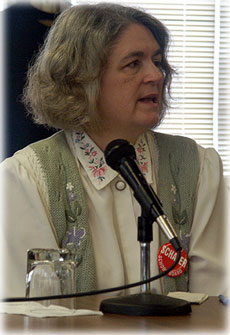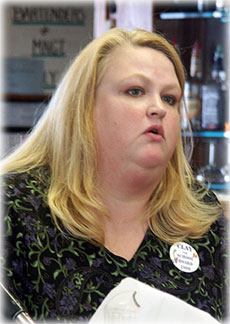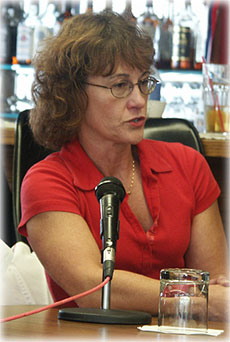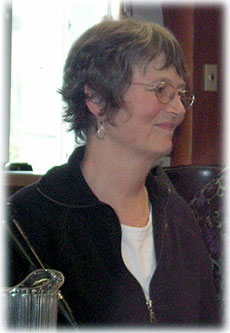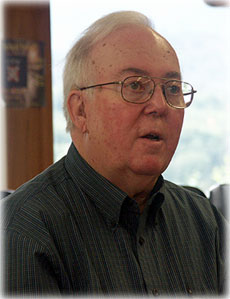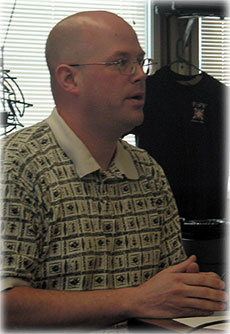 By M.C. Kauffman September 12, 2006
The six candidates who each would like to have one of those three seats had an opportunity last Wednesday to state their positions on various issues and why they would like to serve on the Ketchikan School Board during a luncheon forum held by the Greater Ketchikan Chamber of Commerce. The six school board candidates are Charlotte "Choc" Schafer, Virginia "Ginny" Clay, Deborah Harney, Karen Eakes, Mike Harpold and Matt Olsen. There were no time limits enforced on the candidates' opening statements or their responses to questions. The questions were posed by audience members and the forum began with each candidate giving an opening statement. Opening Statements In her opening statement, Deborah Harney spoke briefly stating that she has served as a member of the Ketchikan School Board for almost four years. She said she is the mother of three and her youngest is a high school Senior this year. Harney remarked that she is a small business owner and is out and about in the community often. Thirty-eight year old Virginia "Ginny" Clay works at Tongass Substance Screening. Clay said she grew up in Ketchikan and has two boys in school - one just starting high school this year and one just starting the fifth grade. Clay noted that she has been involved with Cub Scouts for nine years, with Little League for nine years and has served on the Little League Board. Clay said being a school board member will be a learning experience for her and she hopes that she can be a voice for the people of Ketchikan. Karen Eakes was next to present her opening statement. Eakes, the current director of PATCHWorks, said she has lived in Alaska for 39-years, 33 of which have been in Ketchikan. Eakes said she and her husband raised two daughters and she was a teacher is the local school system for 22-years. After retiring in 1998, Eakes attended graduate school and remarked she had a wonderful experience and brought back a lot of what she learned to share with teachers in the Ketchikan district. "I've been an advocate for education and learning all my life," said Eakes. She said that it has always been her plan and hope to run for the school board because she feels like she has something to contribute - her experience and her perspective working with kids. Mike Harpold, a retired immigrations officer, said he and his wife have lived in Ketchikan for 22-years. The Harpolds have two daughters - one graduated from Ketchikan High School last year and one is a Senior this year. Harpold was first elected to the school board in 1994 and served until 1997 at which time he was president of the school board. After leaving the board, the following year Harpold ran for City Council and was elected. He said he was very proud of his service on the Ketchikan City Council. "I was the swing vote for the intertie," said Harpold. "I still have my plaque for the first chip of wood on the first tree that was felled for the right-of-way on the intertie." Harpold said, "My other big brag on the City Council, the lighted crosswalk out here at White Cliff Avenue. I personally wrestled Karl Amylon to the ground and held him there for two years, keeping Steve Schweppe, the city attorney at bay with my foot, until he finally relented and installed that lighted crossway." Harpold remarked, "That feat has not been replicated since." Harpold said he made an unsuccessful run for re-election to the City Council. A few months later he was appointed to the school board and the following year he ran for a school board seat and was elected. Harpold said he's been very proud of his service on the school board. In her opening statement, Charlotte "Choc" Schafer said she has served on the school board for almost 6 years. Schafer said she believes there have been a lot of accomplishments during those six years. "Because we are a board that works together, anything that happens has to be done by a majority of the board. But I am very proud that we switched to our program-based budget system. I think that works much better and we have a lot better budgeting process and depending upon where the money comes in, it's very easy to make adjustments up or down." Schafer said she would like to see the program-based budgeting continue. Schafer said two of her daughters went all the way through the Ketchikan school district and came out with good educations. "I would like to have that available to all children," said Schafer. "I think the children in our community are the most important resource that we have and we ought to work to provide the best education possible for those students." Matt Olsen began his opening statement saying he grew up and graduated from high school in Ketchikan. Olsen and his wife have a 22-month old daughter. He is currently the Program Coordinator at the business department and networking department at the University of Alaska Ketchikan campus. Olsen said through his work experience he is familiar with the budgeting process - both budgeting for existing programs and deciding if new programs will be added. Olsen said he's volunteered in activities such as sports, summer school, after-school youth activities and various student activities at schools. Question 1: Why did you choose to run for the school board this year? What are your main priorities and what would you like to see changed? Deborah Harney seeking re-election responded to the question stating she would like to see Schoenbar finished while she's still on the board. Harney also said she would like to continue work on the drug policies, dropout and vocational education programs already started. Responding to the question, Virginia "Ginny" Clay as a first time runner for the school board said a lot of things are new to her. Clay said she would like to see the drug policy improved. She said she has a kinship to the drug issue as she sees what drugs can do everyday. "I see what drugs do to kids in this town. I see what drugs do to adults in this town," said Clay. "Unfortunately it is something we need to put some focus on and change in this town. And the way that's going to change is with education," said Clay. Clay said she is learning about the district's budgeting and has a lot of ideas. "I'd really like to understand it [the budget] better." She remarked that she was concerned when her son came home from high school after the first day and she learned he had numerous things to pay for. Clay said that didn't make a lot of sense to her and questioned why he would have to pay for his education. Regarding a seat on the school board Clay said, "I'm looking forward to the challenges. I know it's going to be challenging and I think I can handle challenge pretty well." In her response, Karen Eakes said as a candidate for the school board she would approach all board decisions from the position of will this decision improve and impact student learning? "I think always student learning should be the top priority," said Eakes. On another point Eakes said, "I believe in equity of services to students, staffs and schools throughout the district." "I think that openness of information and communication is vitally important. Most systems can not operate very effectively without that openness in communication," said Eakes. Eakes said, "The word accountability which has been a kind of a buzz word in education for the last twenty years, mostly [refers] to test scores and testing and how kids are learning based on standardized tests. I think accountability has a much broader interpretation." She said, "I think it means shared responsibility throughout the system and I think that is vitally important that everybody take their responsibility from the parents, to the student, to the teacher, administrators, superintendent and the board. We're all answering to the public." Eakes said she believes on building on student's interests, strengths and talents and thinks it could be done more effectively. "I think we lose kids because we don't focus on those things," she said. "Tremendous focus, by necessity, on test scores has definitely impacted how we address education in this town and all over the country," said Eakes. "But I think we are losing students because we don't focus on their interests and their talents and their strengths." "I think we should build our budget and spending and prioritize district's goals." Eakes said she's known for the past few years that there has been a program-based budget. She noted that she hasn't followed that process too well. "But I think if we have goals in this district, that we should address them through our spending and our priorities," said Eakes. "I do know that the goals have remained pretty much the same." As examples, Eakes noted the reading goal and the dropout rate problem. "If we had those really serious goals in this community, then we need to take care of those and allocate the resources and try to make that happen," said Eakes. Eakes said she believes in educating for the 21st century. "I don't think necessarily that teaching the way we always have for the last fifty years is the best way to teach kids and I think to address varying needs we have in our student population we need to develop new strategies." Mike Harpold who is seeking re-election responded to the question next. He said, "Keeping kids in school has always been a big goal of mine." He mentioned that he is involved with the Big Brothers Big Sisters program in Ketchikan and as a Big Brother, child mentoring is one of the more important things done. Harpold said keeping kids in school is a continuing goal. "We have been successful in getting a grant called Safe Schools Healthy Child. With that grant this year for the first time we're going to be able to put money into some of the things that we wanted to do including having parent-school liaisons in grade school." Harpold explained that the parent-school liaisons position is something like a social worker who works between the school and the family to help struggling families and struggling kids. "We're also doing an additional pre-school qualification and we're putting a counselor for the first time at Revilla." Harpold said, "In addition, we found that one of the things that causes children to drop out is lack of reading skills." He said, "This year for the first time in each of the elementary schools we're placing a teacher whose sole job is doing nothing but teaching reading." Harpold said students in the schools now get 90-minutes of reading a day. When a student gets to be 14 or 15 and still can't read, that student's not going to stay in school said Harpold. Another big effort has been strategic planning said Harpold. "I'm really proud of that." Harpold said the effort was adopted in 1994. Harpold asked, "What's the value of a strategic plan?" He answered his question by saying, "In this community where the composition of the board changes with every election, a strategic plan provides continuity." He explained saying you can adopt a goal - a goal can be adopted in 1994, and will remain the goal despite changes on the board. Harpold said the program-based budget was adopted last year when he was president of the board. "What that has done for us is improve the credibility of the school district's budgeting process, not only in the community but with the Borough Assembly. "A board can't function if it doesn't have the confidence of the Assembly and doesn't have the confidence of the community," said Harpold. This year the school is fully funded by the Borough and Harpold credited a lot of that to the program-based budgeting process adopted. The most important thing is keeping the community behind education said Harpold. "All things are possible if we have the community behind us and I think it's important for the board to ensure the policies it adopts and the procedures it implements have the confidence of the community," said Harpold. Charlotte "Choc" Schafer who is also seeking re-election said the first thing she likes to keep in mind when working on the board is what is the best for students. "That's what we are all about." Schafer said, "I think that our program-based budgeting has been a good experience." This current school year is the third year the program-based budgeting has been used. "I think it is a good tool. I think it helps us look at what the programs are and how we want to rank them in priority as to important and also then where do the dollars go," said Schafer. "I think that we need to work on keeping good relationships with the Borough Assembly. I think we need to work on keeping good relationships with the public and make sure the public understands what we're doing and why we've made the decisions that we have made so that we have the public's support," said Schafer. Schafer stated, "I hope people continue to talk with us and I hope I continue to listen so that we can bring different ideas to the table that maybe none of the seven of us have thought of." Schafer told those present that the school district has been meeting the No Child Left Behind requirements. Schafer said, "Each year the requirements get higher and higher." She said, "I would like to continue working with the staff of the district to make sure as many of our children are successful in school in ways that can be measured on these tests and also the graduation requirement test for the State of Alaska." "I would like to make sure the Strategic Plan continues and it isn't just something that ends up sitting on a shelf that nobody looks at for a number of years and then people go back three or four years down the road and say "Oh yeah, what have we done about that?"," said Schafer. "We would like to work on making sure that the plan we have and process continues." She remarked that as the needs of the community change, changes can be made in the Strategic Plan so that the needs of the community are met. Schafer said, "Another reason that I would like to be on the school board again is to help make sure that we have students who will be adults responsible for proper citizenship - that they can read to understand what's going on in the world around them, that they can make good economic decisions and that they can raise good families." She said, "That's all helped by having students who are very well educated in our school district." Matt Olsen who would like to win one of the school board seats said, "The greatest thing a community can do is educate its children. If we can't educate our children, then we are not doing our job as a community." Olsen said one reason he's running for the school board is because he wants to be a greater part of Ketchikan's educational process. Olsen said, "The biggest concern that I have comes from the high rate of kids that are dropping out in the junior high and senior high level classes." He said, "The kids are going through grade school where we have several different educational choices to choose from. We have Tongass School of Arts and Sciences, we have Ketchikan Charter School and then we have the more traditional schools." Olsen said, "When you get to Schoenbar, you get to one type of schooling. When you get to Kayhi, what we're doing now is mostly a college bound track. We've kind of forgotten that vocational education background. Let's face it, this community is a blue-collar community and we've forgotten that." Olsen said, "Twenty years ago we had the electronics program fully functionally at three to four classes a year that taught house wiring or basic electronics. We had a full-time woodshop, we had a full-time welder instructor, we had two full-time automotive instructors, we had a full-time maritime program which had Coast Guard certification. All but two of those are now gone for the most part." Olsen said, "Where this state is going and where this community is going, we still need to build our infrastructure. And Ketchikan is not doing its part to help grow workers into that area." He continued, "Not every kid is going to go to college, and that's okay. What you want to do for your schools as Choc [Schafer] said is produce somebody who is going to be a very good citizen. But you also want them at the high school level to explore their options." As an example Olsen said, "If you take someone who goes through college today, after five years if they're lucky they'll have fifty-thousand dollars [loan] and then if they're lucky they'll get a thirty-thousand dollar a year job. If you enter a trainership program right out of high school because you've taken some vocational classes and you've discovered either one, I want to be an electrician or I want to be a welder - you get paid as you go, you're learning as you go. After five years, if you're an electrician, KPU is hiring journeymen electricians [at] thirty-five dollars an hour. That's a seventy-thousand dollar a year job and you have no loan." Olsen said, "Vocational education is a very important thing that I think we've forgotten in this district." Question 2: Sooner or later many of the school boards focus on micro-managing the district's staff. How do you feel about that? Who do you answer to? Can you stay away from personality conflicts and focus on the duties of a board member? Deborah Harney responded, "I don't think that the school superintendent is my boss. I think the children and their parents are my boss. I think my job, with the other people on the board, is to help make decisions that will help the superintendent know the direction that the public wants the school to go." Harney said, "The school superintendent is in charge of the schools and that would include the staff, and the teachers and the administrators and I don't think that it's my job to be his boss to tell him what, when, where, how. Presumably that's why we hired him and he gets paid a lot more as school superintendent than I do on the school board." Harney said, "I think we need input from the public so we can help him do his job, but I don't want that job." She said, "Bosses are bosses and sometimes they have to make decisions that we don't like, but it's their job. And if they do their job well, they are probably going to make somebody upset somewhere along the way." Virginia "Ginny" Clay said, "Not to have personality conflicts would be idealistic. It's going to happen." She said, "I know that if I came into a personality conflict with someone that I would do it in an adult manner. I'm not going to be picking on anyone - that's not the job of the school board." Clay said, "The school board is to be a team to work together for what the parents want and what the kids need." Clay said, "[Superintendent] Harry Martin is the person who the school board answers to but I also see him looking at the school board for guidance. He can't do it all, he needs the school board to be behind him kind of like the newspaper reporters for the editor - they're back there gathering the information and making sure it's all running smoothly and I see that as our job." Clay said, "I hope that we don't have any conflicts. I don't like conflicts but it will probably happen. In a perfect world it wouldn't, but we're not perfect unfortunately." Karen Eakes said, "I think if this whole system is functioning optimally and the board has a clear vision of what their role is, and the superintendent has a clear role of what his role is, there'll be less conflict." Eakes said, "I think it comes back to that whole issue of shared responsibility and knowing what your responsibilities are." Referring to communication and information which Eakes had addressed earlier, she said, "Everybody needs the same information, everybody needs to hear the same information and the communication needs to go both ways." Eakes said, "I think if you have that open system you're less likely to run into problems but I do think they are inevitable when hard decisions have to be made." Eakes said, "I obviously would not want to micro manage the superintendent but I would like him to be accountable to provide me, if I'm on the board, with information I need to make the best decisions I can." Mike Harpold responded, "There are times when the superintendent must lead and the board must support him. There are other times when the board must lead and the superintendent must support the board. But at all times we all must cooperate and educate the children." Harpold noted that he'd had a number of years in management and supervision. "The superintendent is charged with running the school district, supervising almost three-hundred employees and administering a budget up close to 23 million dollars. That's a big job." Harpold continued, "The school board is charged with setting policies and overseeing what the superintendent does. And that's a pretty big job." He said, "We're always suppose to keep in mind all the differences in our two roles and one must respect the role of the other." Harpold said, "We all have to cooperate in getting that job done - and that job is to educate our children." Charlotte "Choc" Schafer responded to the question saying, "The superintendent is the employee of the school board. That position is someone who is hired for their expertise in the field of education because we don't know enough. We do oversee some of his decisions. We do it related to his choice of administrators and where he has moved those [administrators]. That's required in his contract." Schafer said, "We [the school board] also make budget decisions." She said, "I think we found two years ago when there was a change made in our program-based budget that we would do an awful lot more micro managing than we wanted to when that budget came to us." Schafer said, "This last spring when we were putting together the budget for this year we requested to go back to the way we did it the first time so we wouldn't get caught up in micro managing so it would be easier for us to do a broader job and not get into the little pieces." She said that worked very well. Schafer said the school board has an attorney for advice and she said, "We hire the attorney for advice." Schafer said, "As a group we have been pretty good about not micro managing and when we found ourselves micro managing we fixed it so it didn't happen again." In response to the question Matt Olsen said, "The school board members serve at the public's whim. And that's what elections are for." Olsen said, "The school board as a whole does not belong in individual classrooms." He said the board sets the overall boundaries of where the school board wants the district to go and then the board leaves it up to the staff. "In terms of supervising the superintendent, that is one of the school board's responsibilities," said Olsen. He added that it's the board's responsibility to evaluate the school superintendent. Question 3: With the open campus for lunches, there are kids that should probably be at school that are still driving around town. What do you think about a closed campus? Deborah Harney said she has a senior and this has been a hot topic at her home. "I do think it [closed campus] would solve some problems. I think we would have to go to a split lunch and that would be difficult," said Harney. Harney said she knows a lot of people whose kids go home to eat to get away from the campus which can't be done with a closed campus. Harney said, "I would have to say at the moment that I'm still mixed opinion. I know that's sitting on the fence, but I'm probably leaning towards not closing it [the campus]." She said, "I say that with having had one son that actually did have a semi-closed campus." She explained that the semi-closed campus required the student to check in with the Vice-Principal before and after lunch. Virginia "Ginny" Clay said, "I think that having the closed campus could work into the restructuring of the day and get these kids maybe even on split-shifts or something, but going to school a little longer so that they can take advantage of some of these vocational programs." Clay said when she attended school there was a closed campus and she doesn't recall having a problem with it. Referring to the students, Clay said, "School is your job and that's where you are during the day." She said the students can take their break and spend twenty minutes in the lunchroom visiting with their friends. "I don't think that it's that big of a problem." Clay said, "I am for a closed campus." Karen Eakes said the topic of open or closed campus has been addressed several times in the past. "It's always been a very hot issue," she said and there is no simple answer to this question. Eakes said, "I tend to lean towards keeping the open campus for one reason. I think our job primarily when kids are in high school is to, in addition to everything they have to learn, teach responsibility. And I think if we close the campus, we're telling kids that they can't assume responsibility." "Responsibility means not only being able to leave but being back on time," said Eakes. "I'd like to believe that there are mechanisms in place that if kids aren't on time, there's some sort of repercussion for that." Eakes said there are just so many tardies and so many absences that students can have before they are in trouble with passing the class. If students are not handling responsibility well now, then they need to prove that they can said Eakes. With two teenage daughters, Mike Harpold said he didn't think he could go home and say he was for closing the campus. Harpold noted that the board will be discussing this topic at the next board meeting on September 13th. He said, "One of the questions I have to ask the superintendent is what is our tardy rate first hour after lunch?" Harpold said, "In general, if kids have behavioral problems keeping them in school for the half-hour lunch is not going to solve that. In fact, it might produce some opposite results." "In general, I'm not in favor of closing the campus," said Harpold. Charlotte "Choc" Schafer said she hasn't made up her mind but that she is leaning towards closing the campus. "That because of course when I went to school we had a closed campus." Eliciting laughter Schafer said, " They even put a chain across the student parking lot so that you couldn't leave." Schafer said there are a number of questions that would need to be answered - what is the tardy rate and how many students aren't returning to school after lunch? If the district does close the high school campus, Schafer said they would have to decide what they are going to do about providing food for all of the students and providing room for them to eat. She said, "Are we going to go to split lunches?" She noted that she doesn't know how many high school students can actually be seated in the commons area where students eat lunch. Schafer said, "There are just a number of issues that need to be answered before I can make a good decision." She added, "As I said, right now I'm leaning towards closing the campus if there is a problem." Schafer added that she had heard from businesses and there is a problem with having students out at lunchtime. Matt Olsen said he is against closing the campus for several reasons. We've got to start teaching responsibility and this is one of the ways responsibility can be taught said Olsen. He asked the audience, "How many of you sit at your desk and work through your lunch every day?" Olsen said he relishes his lunch hour when he can get a break from thinking work mode and a break from the building and free his thoughts. He said, "I think that's a very valuable thing." Before making a decision about closing the campus, Olsen noted that nothing had been studied yet to know if there is a truancy issue. He said another issue is that you're going to have to require high school teachers to monitor the students during lunch which Olsen said would be like recess-duty. "Is that one the district can monetarily afford?" asked Olsen. "At this point, I would say everything says no, we don't close it," said Olsen. The Greater Ketchikan Chamber of Commerce will host a Borough Assembly candidates' forum this Wednesday at noon, September 13, 2006. Voters will have the opportunity on October 3rd to select two Borough Assembly Members from the six candidates who are seeking the two 3-year term seats. Candidates for Borough Assembly are George Tipton, Richard "Dick" Coose, Robert "Gus" Gustafson, Gregory Vickrey, Mike Salazar and Dave Kiffer. On September 20th, the Chamber in conjunction with Southeast Conference will host a forum for the candidates for Governor at the Ted Ferry Civic Center from noon to 1:30 pm. The forum for City Council and City Mayor will be announced. Publish A Letter on SitNews Read Letters/Opinions
|
||
